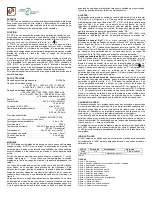
34
• Check that channels and groups on all
communicating devices are identical
(except when using the Auto-Sync
advanced feature). When turning on
the unit, it is important to review and, if
necessary, reset the group selection.
• If your first choice of channel does not
work, try a different channel until you
find one that works.
• Ensure that all cables are installed
correctly.
• Make sure that the power source for
each device is properly installed and
carrying a sufficient charge. Weak
batteries can reduce the distance over
which a transmission works.
• If you are triggering your transceiver
with a wired connection, make sure the
device is connected using the correct
cable and the cable is connected to the
correct input port.
• Make sure that a communication
confirmation appears on the LCD
screen when sending a signal.
Troubleshooting
• Verify that flash and camera equipment
are operating properly.
• If in use with PowerSync 16 unit(s),
ensure that the channel configuration
is identical. Refer to the ‘Backwards
Compatibility’ section of this manual
on page 12.
• Check for a stuck Test button on all
units, including flash devices.
• Make sure the devices are within the
maximum operating range. For details,
please refer to the Maximum Operating
Range section of this manual on page 32.
If your PowerSync 16 won’t communicate
with your PowerSync 16-80, please refer to
the following troubleshooting suggestions:
• Make sure your PowerSync 16-80
transceiver is set to the default no
group setting.
• Make sure all devices are powered on
with fresh batteries.
• Ensure the channels on both devices
are identical. Visit page 11 for more
information.



































